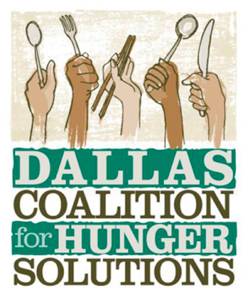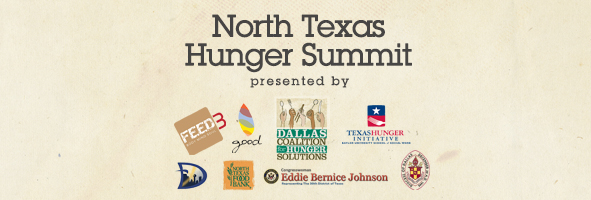Dallas Poverty Alarms Leaders and Advocates Seeking to Make a Difference
DALLAS—Participants at the Fourth Annual Hunger Summit in Dallas were presented with some very sobering statistics by Dr. Tim Bray of the University of Texas at Dallas. Dr. Bray told the group that 25% of Dallas residents are living below the poverty line (a family of three is considered living in poverty if they make below $20,090), and another 46% of Dallas residents live below 185% of the poverty line (this means that a family of 3 makes less than $37,167). Poverty in Dallas grew 49% since 2001. Children account for 124,884 or 38% of those living in poverty.
Dallas has the second fastest growing rate of poverty among large cities of its size, which accounts for a 59% increase of impoverished children. Hispanics and African Americans lead the totals of the impoverished, with 156,104 Hispanics and 98,888 of African-Americans experiencing the greatest financial challenges.
It is estimated that for a family of three to survive on what is considered a “living wage”, that family must make an hourly wage of $24.83 or $51,650 annually before taxes. After taxes, the family has $46,315.
The occupations whose employees have the hardest time struggling to make ends meet living in Dallas are in the education, training, library field ($47,200), Healthcare Support ($24,600), Protective Services ($37,000), food preparation, serving and related ($18,620), Office & Administrative Support ($30,920), production ($30,460), and Community and Social Services ($42,580).
Randy Skinner, whose organization FEED 3 is a founder and co-sponsor of the Dallas Hunger Summit, puts the numbers in perspective:
“For an individual to understand the challenges these families make, compare what your family spends on the following compared to a family of three needing to make $46,315 after taxes. Over the course of a year, they will have $6,704 for food, $10,956 for housing, $6,534 for medical, $7,977 for childcare, $9,859 for transportation, with $4,284 for other expenses. These families have to be very frugal and determine where they can cut costs and rely on family, churches and community support groups to help.”
Skinner says the challenge faced by city, county, state and national leaders is where will the difference be made up in the “living wage” scale. The current administration under President Obama has increased welfare benefits to families in poverty totaling in the billions of dollars attempting to make up for the difference. Skinner is hopeful that the faith-based initiatives begun by President Bush to replace government programs with churches responding to poverty and hunger can be increased. Currently the faith based initiative programs are relying on government funding being implemented through churches, whereas in the past they purposed do their programing through private donations.
“The number of families in poverty will continue to increase with the lackluster national job numbers and low paying wages. The real answer for city and county leaders will be how many good paying jobs they can create to turn our city around”, says Skinner.
Dallas Mayor Mike Rawlings has appointed a task force to focus on solving poverty in the city.
Mayor Rawlings at a recent gathering of advocates fighting poverty and hunger admitted that when first approached by Skinner to confront poverty and hunger in Dallas, he was skeptical of the numbers. "The sad part is we are the tale of two cities. Because people don’t realize, this, the poverty in Dallas leads the nation. We are the number one city of children growing up in poverty. Something like 38% of Dallas children go to bed and wake up in poverty. When Randy kept talking to me about his initiative with hunger, I had a tough time intellectually understanding it." said Rawlings.
"I started studying it, talking with families, going to schools. There are so many kids that don’t have the basics. We have thousands of kids that don’t have a mattress to sleep on. I feel specially called to solve these issues in the right way. It's the right thing to do, it’s a biblical thing, also it’s good business sense." Rawlings concluded.
The mayor, speaking of FEED 3, said “This is what makes our city special. Our city is known for grabbing an issue and addressing it in a big and successful way. Randy Skinner has done that around hunger. It’s marvelous to see his work and to see how God works through him as well”. FEED 3 fed over 83,000 meals this past summer to inner city kids in need.
The Hunger Summit also heard the moving story of a community in South Dallas that has no running water or electricity. Pastor Eugene Keahey of the Sandbranch community located 18 miles south of Downtown Dallas shared about his work among the community of 100 people. He challenged the more than 200 attendees to help him bring the basics of clean water, sewage, and electricity to his community.
For more on this: https://keranews.org/post/one-corner-dallas-county-100-people-live-without-running-water
 The Hunger Summit also heard from Dallas Baptist Association Jana Jackson on the accomplishments of four action teams. Helping bring a coordinated approach to hunger in the Dallas area, the coalition created action teams to address four goals—increase access to federally funded programs; increase access to programs that are not federally funded; grow and provide access to healthy food by promoting a local and sustainable food system, and decrease the number of food deserts and food deserts (areas will little or no grocery stores).
The Hunger Summit also heard from Dallas Baptist Association Jana Jackson on the accomplishments of four action teams. Helping bring a coordinated approach to hunger in the Dallas area, the coalition created action teams to address four goals—increase access to federally funded programs; increase access to programs that are not federally funded; grow and provide access to healthy food by promoting a local and sustainable food system, and decrease the number of food deserts and food deserts (areas will little or no grocery stores).
The summit concept came about after Congresswoman Eddie Bernice Johnson of Dallas viewed a video from local nonprofit FEED 3, detailing the high rates of hunger in her congressional district. Determined to change the hunger landscape, she asked FEED 3 and other local nonprofits to join her to work towards realistic goals. Working with the Republican Texas Agriculture Commission, and Mayor Tom Leppert, the Hunger Summit was birthed.
It was created along with a committee of local nonprofits, church and business leaders which eventually became the Dallas Coalition for Hunger Solutions.
Working to help develop the Dallas Coalition, has been The Texas Hunger Initiative- the result of Baylor University School of Social Work.
The local coalition includes the Dallas Baptist Association, Episcopal Diocese, North Texas Food Bank, Dallas Independent School District, Good Indeed, Get Healthy Dallas, FEED 3, and the Dallas Office of Mayor.
For more information on opportunities to serve with one of the four action teams of the Dallas Coalition for Hunger Solutions, please contact us: info@feed3.org or
For more information about FEED 3 and partner Strategic Justice Initiatives Inc. summer feeding programs or one of its 27 sites, please contact:
Randy Skinner at info@feed3.org
Your tax-deductible gifts can also be mailed to Strategic Justice Initiatives. P.O. Box 222026, Dallas, Texas 75222.
To help end malnutrition, hunger and poverty in our region, please consider a generous donation: Click here:
Give Now













